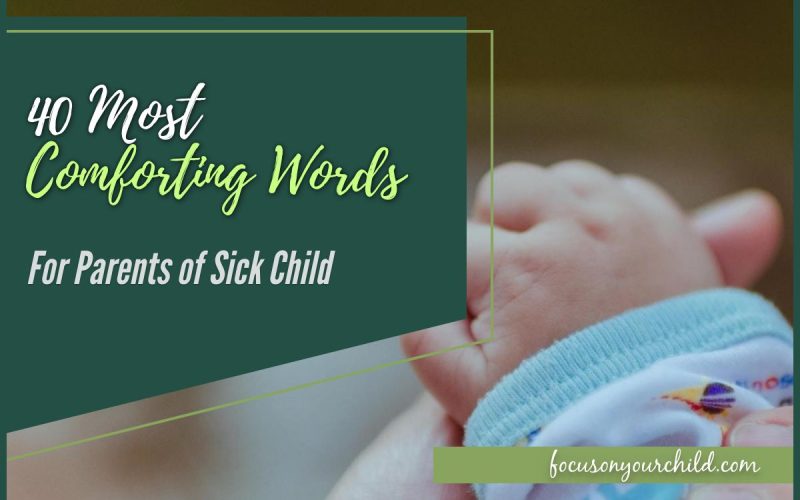If being a parent wasn’t hard enough, being a parent of a sick child is even harder. There is no worse feeling than a parent feeling like there’s nothing they can do to make their child feel better. If you have friends or family who might be going through this, know that words of encouragement can make the biggest difference.
The most comforting words for parents of a sick child to hear are words that let them know that you’re with them through this battle. These comforting words don’t have to be complicated. They can simply be asking how they are or even asking if they need any help. At the same time, there are words that you might want to avoid saying.
This article will list 40 of the most comforting words that parents of sick children would love to hear, including some words you may want to avoid.
Comforting Words for Parents of Sick Child
-
“I am so sorry you have to go through this.”
This is one of the first words many people say to parents who have a sick child. These are comforting words that lets the parents know you are empathizing with them. This is especially powerful if you have kids of your own because they know you’d understand how it feels if it were you in their shoes.
-
“I am here for you.”
These may be simple words, but these are among the most comforting words for parents of sick child. These are five little words that remind them they are not alone in this fight. You may not be their child’s parent, but that doesn’t mean you won’t be alongside them throughout this whole ordeal.
-
“They’re going to get better.”
This is very comforting for parents who may have forgotten to see the light at the end of the tunnel. However, you should be careful when saying this. While it may sound comforting to some, it can come off as insensitive depending on the nature of the child’s sickness.
-
“Stay strong.”
-
“How are you?”
These words are especially comforting to parents who may not have seen you for a while. Asking them how they are is an incredibly powerful way to let them think and talk about themselves, even for a tiny bit. Without a doubt, parents of sick children think of their children most of the time, and they can sometimes forget about themselves in the process. Asking how they are is a simple way to ground them back again, even if it’s just for a little while.
-
“This too shall pass.”
Like every storm in life, this too shall pass. This is an old adage that can be traced back to ancient times. Even then, people knew that all storms eventually end. Be careful when using these words because some people are not as appreciative when hearing general quotes and sayings when they’re going through a tough time. However, some parents might need to hear this phrase to relieve themselves of the burden they are carrying.
-
“I’m listening.”
While you can say all the comforting words you want, some parents might rather want you to listen to them instead. This is especially applicable to parents who may have already heard many words from other people and would actually want to say something else themselves. When parents are too busy taking care of and worrying about their sick child, they may not have the time or the outlet to let their feelings be heard.
-
“You are the bravest person I know.”
You have to genuinely mean this when you say this, but if you’re saying this to a parent of a sick child, you probably mean it. Parents of sick children might feel like life is a blur of hospital visits and doctor discussions. However, reminding them of their bravery can help them get a grip and regain control of their life.
-
“You are in my thoughts and prayers.”
-
“Can I get you something?”
Nothing is more difficult than being a parent of a sick child. They are doing everything they can to help make their child feel better – sometimes to the point of neglecting themselves. It is important to ask them every now and then if there’s anything that you can help them with because that makes them feel like you truly are with them in this fight. Asking if they need anything reminds them that there are people out there who love them.
-
“Let me know if you need anything.”
This is very similar to the one before it, but there is a subtle difference. Asking someone if they need anything lets the parents know at that moment that you’re ready to help. However, telling them to let you know if they need anything assures them that you are a part of the team and that you are ready to help as soon as they ask for it. The difference may be small, but the impact of the words can mean a lot depending on the audience.
-
“I am praying for your family.”
This is a very simple yet powerful phrase that can do well in comforting the parents of a sick child. Even if the parents are not religious, letting them know that you pray for them lets them know that you are doing the most you can in your position, despite the difference in beliefs.
-
“I love you.”
Letting someone know you love them is always comforting, especially to those who need to hear it the most. Parents taking care of sick children pour all their love onto their sick child. Thus, it is important to let them know that they are loved as well.
-
“I’m sorry, I don’t know what to say.”
There is nothing wrong with letting them know that you don’t know what to say. It’s perfectly understandable. Chances are, they don’t know what to say about the situation as well. However, this phrase is genuine, and they’ll know it.
-
“I’m getting you coffee. What kind do you want?”
This phrase is best said in the morning. These are great words for parents of a sick child to hear first thing in the morning. These are parents who probably lack sleep and are already starting their day as they take care of their kids. However, asking them if they want coffee or tea in the morning lets them know that you’re on your way, you’re going to spend time with them, and that you care enough to bring them something to drink as well.
-
“Have you eaten [meal]?”
By simply asking them if they’ve eaten breakfast, lunch, or dinner, you are letting them know that you’re concerned for their well-being. Most of their time is reserved for their child, which means that they often lose sleep and even skip meals from time to time. If they respond that they haven’t, go ahead and get them something to eat. You can even follow this up by saying:
-
“What do you want to eat?”
Asking them what they want to eat reminds them to take care of themselves every now and then. The number one priority of parents with sick children is their kids, and that can mean that they may not have eaten their favorite food in quite a while. Go ahead and ask them what they want to eat and get it for them. They will greatly appreciate the gesture and be comforted by your presence.
-
“I can babysit if you need a hand.”
This is an excellent phrase to tell parents of a sick child, especially when you know they haven’t had a break in a long time. Taking a shift when it comes to taking care of their child can really set the impression that you’re there to be with them through thick and thin.
-
“How’s [child’s name]?”
Asking how their child has been doing is a simple yet significant way to comfort the parents. Taking care of their child has been the only thing they have been doing for some time, and they can be more than eager to share how their child has been doing. However, caution should be advised. The response to this question can vary, highly depending on the status of their kid’s health.
-
“What do you need over there?”
Many of these phrases are highly similar to one another. However, they all have subtle differences that make them significantly different. For example, this phrase may seem similar to “can I get you something?” While that is true, this phrase bypasses asking if you could help them or not – you are going straight to the point that you are headed over and that you can stop by for anything they may need.
-
“Do you need help around the house?”
When parents take care of sick children, household work ceases to be a priority. Of course, they can still have the energy to do the necessities such as wash the dishes and vacuum the floor. However, there may be other household chores that are left behind, such as giving the dog a bath or yard work. Giving them a sincere offer lets them know that you are willing to lend them a hand at chores that you know they don’t have the time for.
-
“How much sleep have you had?”
These words are quite similar to asking if they’ve already eaten. Asking parents how much sleep they’ve had imparts the notion that you are concerned for their well-being. Depending on their answer, you could always offer to take a shift in keeping watch over their kid if they haven’t had any sleep yet.
-
“Let me look after the kids today.”
Parents of sick children might not have had a day off in a long time. Thus, offering to take care of the kids for even a single day can mean the world to them. However, you might have to fight their urge to reject the offer because of their urge to stay by their child’s side.
-
“One day at a time.”
-
“You are not alone.”
Most of the comforting words for parents with sick children revolve around reminding them that they are not alone. This could be in the form of telling them that you’re there for them. This could be in the form of lending them a hand. Sometimes, a simple sentence can do the trick as well. Every now and then, be sure to remind them that they are not alone.
-
“Your family needs you now more than ever.”
Sometimes, the best words to tell a parent of a sick child is that they have friends and family to help them lighten the load. However, there are some that are fueled by their familial duties. However, proceed with caution when using these words. These are words that may be best said when you are certain that they still have the energy. You might run the risk of overwhelming them with the responsibility.
-
“I wish [child’s name] a speedy recovery.”
Parents can often get lost in their own thoughts, especially when they are taking care of their sick child 24/7. Saying something simple and sweet, such as wishing their child a speedy recovery, can put a quick smile on any parent’s face.
-
“You’re the strongest person I know.”
To be able to pull this off, you have to say this from the bottom of your heart, as this phrase can easily be said with ingenuity. People can easily say this thinking that parents love hearing this. However, it can actually rub them the wrong way. However, it’s a good reminder to give them if you truly mean it.
-
“Do you need a lift to the hospital?”
Offering a parent a lift to the hospital is a small but precious act of love, especially if you know that they go and visit their kid at the hospital every day. You don’t even need to stay at the hospital with them all day. The very fact that you brought them to the hospital that day has already comforted them significantly since you helped them tick something they had to do for that day.
-
“What does [child’s name] want?”
Since they have their kid on their minds all day, it is especially comforting when you ask them what their kid likes. This could be you offering to bring their child some food, maybe a toy – anything really. It’s the thought that counts, and the fact that you’re asking already means so much to them.
Words to Avoid
-
“It’s all God’s will.”
It is not advisable to tell parents that their children are sick because “it’s God’s will,” especially if the parents are not religious people. However, even if you and the parents are both religious, it might be best to let the parents say this themselves if that’s how they feel.
-
“Your child will be fine. I know someone who went through the same thing.”
Even if you know other people who have had children survive the same sickness, you should not tell them that their kid will be fine just because of your experience. Understandably, you might have the urge to say it to try and reassure the parents. However, saying this only invalidates the parents’ feelings and emotions.
-
“Everything will be fine. Don’t worry about it.”
You should never tell a parent to stop worrying about their child, especially if their child is sick. Telling parents that everything is fine and that they shouldn’t worry also invalidates the difficulties that the family is going through. Everything is not fine. Their child is sick, and they are naturally worried.
-
“Will there be any long-term effects?”
You might genuinely be concerned regarding the child’s well-being in the long term. However, it is not advisable to ask the parents if the sickness will bring about any long-term effects on their child. They are currently handling the situation at hand, which is the health of their child, which means they may not yet be thinking about what the sickness means in the future. Thus, asking them about the long-term effects will just cause them to worry about something they may not yet have considered.
-
“At least . . “
Their kids are the most precious thing in the world to them, and when they are sick, parents don’t really want to hear comparisons to their situation. You might feel that telling them something like “at least it could’ve been worse” would make them feel better – it won’t. Telling parents “at least” statements does not take away the validity of their situation – it doesn’t make them any less real.
-
“Will [child’s name] be able to live normally?”
Of the worst things to say to a parent, this might be one of the worst. No matter the outcome of the health condition, parents would like to believe that their children will be able to live their lives to the fullest, especially with their help. Thus, asking whether or not their child will be able to live normally shows your own doubts about their ability to make that a reality.
-
“Kids are tougher than you think.”
Parents know that their children are tough. They could see it every day as their child fights the sickness on a regular basis. What they don’t need is you telling them that the kids are tough. Parents already know that and don’t need to test the limits. They just want their kid to be alright.
-
“It’s not that bad.”
Parents don’t need to hear if you think the situation is bad or not. They are going through a very difficult time, and you shouldn’t come in and invalidate how they feel. If they feel it’s that bad, it’s that bad.
-
“Does it run in the family?”
If the child has a condition that was acquired due to some hereditary factor, you should not be asking if it runs in the family. Not only is it a horrible thing to ask, but it can remind the parents that what’s happening to their kid is because of their genes. Sometimes the best thing to do in these situations is simply to be an ear to listen if they need anything.
-
“If you have faith, they will be healed.”
Firstly, this statement can only be targeted to a parent who is religious in the first place. Secondly, this implies that the parents’ faith is not enough in the event that the child’s sickness will worsen. Either way, these are words that you should never say to a parent of a sick child.








